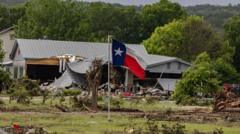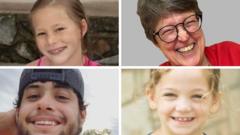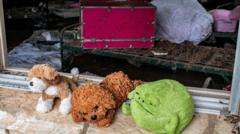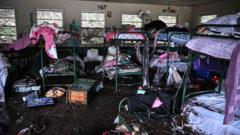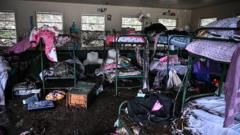In a notable shift, American men are increasingly finding solace and identity within the Russian Orthodox Church, spurred by a desire for traditional masculinity and a reaction against contemporary views on gender roles. The Church, particularly under the leadership of charismatic priests like Father Moses McPherson, promises a brand of virility that resonates deeply with these men.
Young American Men Embrace Russian Orthodoxy for Traditional Masculinity

Young American Men Embrace Russian Orthodoxy for Traditional Masculinity
A growing movement sees young U.S. men drawn to Russian Orthodox faith as a reaction against modern societal norms.
The growing religion draws flocks of young men, with Father Moses—whose congregation tripled in size within 18 months—championing a resolute form of masculinity, often ridiculing perceived "feminine" traits in men. The recent influx of converts, many disillusioned by modern American life, seeks meaning and structure that they feel is lacking. Converts like software engineer Theodore recount feelings of emptiness despite their success, aligning with the notion that society has unfairly vilified traditional male roles, such as being the primary breadwinner.
The ROCOR community, often viewed as one of the more conservative factions of Orthodoxy in America, encourages familial structures rooted in traditional values. A significant trend observed is the choice of home-schooling by these families, ensuring religious and moral teachings while avoiding contemporary social issues that they believe conflict with their values.
The Church’s growth contrasts starkly with the broader demographic of Christianity in America, emphasizing that while the majority of evangelical congregations are large, Orthodox communities remain small yet increasingly vocal—similar to political attitudes emerging in recent years. The church can be viewed as a microcosm of broader cultural and ideological shifts, especially among young males seeking alternative narratives in a rapidly changing world.
The pandemic served as a catalyst, leading many to explore faith more deeply, with data indicating a significant rise in male converts. This digital age plays a pivotal role, where platforms like Instagram and podcasts foster communities surrounding Orthodox beliefs and alternative views on masculinity.
However, the Church's association with strong political narratives, particularly post-2020 election and during the ongoing Ukraine conflict, complicates its landscape, as some adherents find themselves at odds with mainstream narratives surrounding Russia, complicating their faith journey.
As Father Moses champions the notion of larger families and traditional beliefs, the appeal of this form of Orthodoxy continues to grow among many young American men seeking roots in a world they find increasingly disheartening.
Religion, Masculinity, Community, Societal Change, Russian Orthodoxy
The ROCOR community, often viewed as one of the more conservative factions of Orthodoxy in America, encourages familial structures rooted in traditional values. A significant trend observed is the choice of home-schooling by these families, ensuring religious and moral teachings while avoiding contemporary social issues that they believe conflict with their values.
The Church’s growth contrasts starkly with the broader demographic of Christianity in America, emphasizing that while the majority of evangelical congregations are large, Orthodox communities remain small yet increasingly vocal—similar to political attitudes emerging in recent years. The church can be viewed as a microcosm of broader cultural and ideological shifts, especially among young males seeking alternative narratives in a rapidly changing world.
The pandemic served as a catalyst, leading many to explore faith more deeply, with data indicating a significant rise in male converts. This digital age plays a pivotal role, where platforms like Instagram and podcasts foster communities surrounding Orthodox beliefs and alternative views on masculinity.
However, the Church's association with strong political narratives, particularly post-2020 election and during the ongoing Ukraine conflict, complicates its landscape, as some adherents find themselves at odds with mainstream narratives surrounding Russia, complicating their faith journey.
As Father Moses champions the notion of larger families and traditional beliefs, the appeal of this form of Orthodoxy continues to grow among many young American men seeking roots in a world they find increasingly disheartening.
Religion, Masculinity, Community, Societal Change, Russian Orthodoxy





